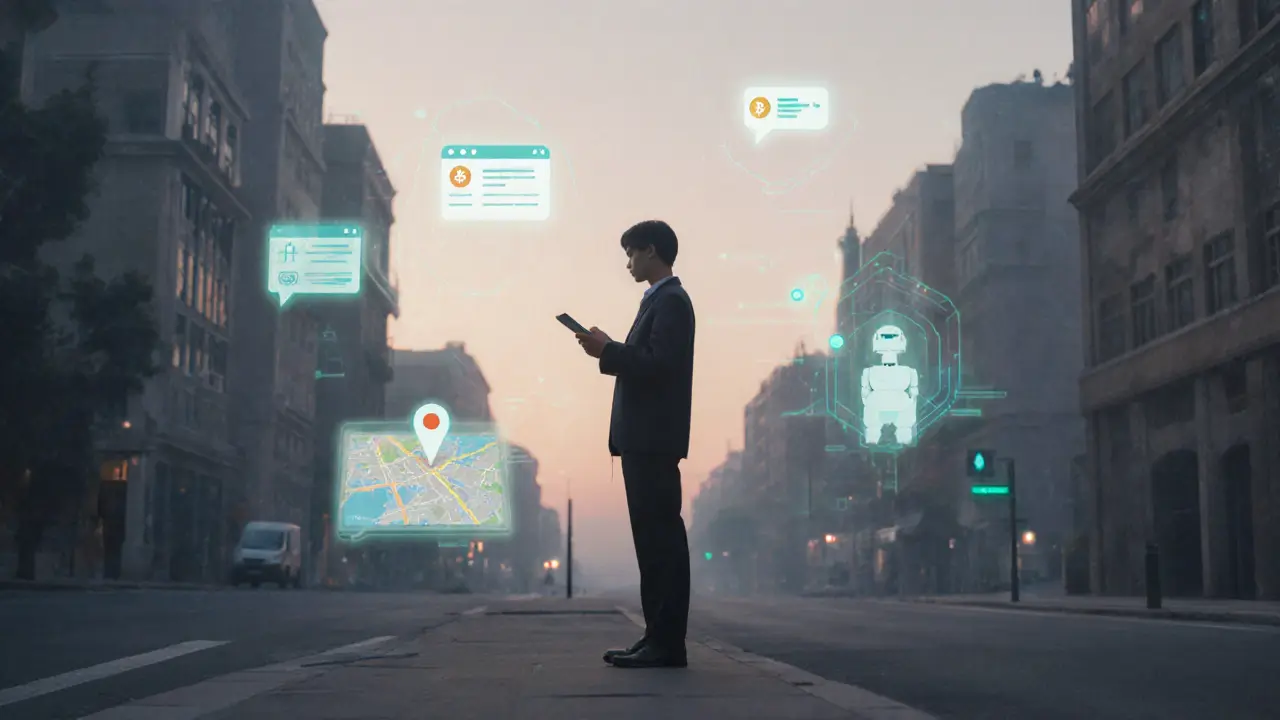When someone searches for "prostitute near me," they’re not just looking for a name or address. They’re asking a question shaped by fear, curiosity, or desperation-and technology has rewritten the rules of that search entirely.
It’s Not Who You Know, It’s What App You Use
Ten years ago, finding someone for sex often meant walking streets, calling numbers from flyers, or trusting strangers in dimly lit parking lots. Today, that search happens on a screen. Apps like Tinder, OnlyFans, and niche platforms like AdultWork or Redbook have replaced street corners. You don’t need to know someone’s face to arrange a meeting-you just need a profile, a location toggle, and a payment method.These platforms don’t just connect people. They vet them. Profiles include photos, reviews, verified IDs, and even health certificates in some regions. Users filter by price, location, services offered, and even language. The search for "prostitute near me" now looks more like finding a plumber on Thumbtack than stumbling into danger.
The Rise of the Independent Contractor
The people behind these profiles aren’t victims of trafficking-most are independent workers. A 2023 study by the University of California found that over 78% of online sex workers in the U.S. and Canada chose this work voluntarily. They set their own hours, prices, and boundaries. Many have college degrees, full-time jobs, or families. Some use the income to pay off student loans. Others use it to escape abusive relationships.Technology gave them control. They use encrypted messaging apps like Signal to screen clients. They share GPS coordinates only after verifying identity. They collect payments through crypto or digital wallets to avoid banks freezing accounts. They even use AI tools to generate fake profiles for safety, or auto-reply bots to filter out dangerous requests.
How Law Enforcement Keeps Up (And Falls Behind)
Police still chase old models. Raids on massage parlors, sting operations on street corners-these tactics haven’t kept pace. In 2024, the FBI reported a 62% drop in arrests for street-based prostitution compared to 2019. Why? Because the street work is gone. It moved indoors, behind screens, encrypted and decentralized.Law enforcement now tracks IP addresses, payment trails, and domain registrations. But when a worker uses a VPN, a burner phone, and a crypto wallet, tracing them becomes nearly impossible. Platforms that host these services often operate overseas, making legal action even harder. The real target isn’t the worker-it’s the payment processors, the hosting companies, and the algorithms that match clients.

What Happens When Apps Get Shut Down?
When Backpage was taken down in 2018, or when Facebook banned adult content, workers didn’t disappear. They migrated. Some went to Telegram. Others built private websites. A few returned to the streets-but only because they lost access to tools that kept them safe.Shutting down an app doesn’t stop the demand. It just pushes it into darker corners. A 2022 study in the Journal of Sex Research found that after major platform crackdowns, violence against sex workers increased by 31%. Why? Because safety features-like client ratings, shared location alerts, and emergency buttons-disappeared overnight.
Technology Doesn’t Create the Problem. It Reveals It.
The real issue isn’t technology. It’s the stigma. The laws. The lack of labor protections. The fact that people still think sex work is inherently exploitative, even when the person doing it says otherwise.Technology didn’t invent prostitution. It exposed how broken the system is. It showed us that people will find ways to exchange money for intimacy, whether it’s on a sidewalk or in a Slack DM. The question isn’t whether tech makes it safer or riskier. It’s whether society is ready to treat sex work as work-and give those who do it the same rights as anyone else.

What You Should Know Before You Search
If you’re searching for "prostitute near me," here’s what you need to understand:- Most services today are booked online. Street work is rare and dangerous.
- Legitimate workers use profiles with photos, reviews, and clear pricing. Avoid anyone who refuses to communicate in writing.
- Never send money before meeting. Use escrow services or payment platforms with buyer protection.
- Always share your location with a trusted friend. Use apps like bSafe or Noonlight to trigger alerts.
- Check if the person has a verified ID or health certificate. Many platforms require this now.
- Know your local laws. In some places, even asking for sex work is a crime.
There’s no magic app that makes this risk-free. But the tools that exist now-when used wisely-can make it far safer than it ever was before.
Why This Isn’t About Morality. It’s About Survival.
People don’t become sex workers because they’re broken. They become them because the system failed them. A single mother working two jobs can’t pay rent. A student drowning in debt sees a way out. A queer person kicked out of their home finds income where others won’t offer it.Technology didn’t create this reality. It just made it visible. And now that we can see it, we have a choice: keep pretending it’s a problem to be erased, or start treating it as a human issue to be solved.
Is it legal to search for "prostitute near me"?
In most places, searching isn’t illegal-but arranging or paying for sex often is. Laws vary by state and country. Some areas decriminalize sex work entirely (like New Zealand), while others punish both the worker and the client. Always check your local laws before taking any action.
Are online sex workers safe?
Many are safer than street-based workers because they screen clients, use encrypted communication, and avoid isolated locations. Platforms that allow reviews and ID verification reduce risk significantly. But safety depends on the individual’s practices-not the platform. Always verify identity, share your location, and never pay upfront.
Can I get arrested for using an escort app?
Yes. In many U.S. states, paying for sex-even online-is a criminal offense. Some jurisdictions target clients more aggressively than workers. Even browsing certain sites can raise red flags with law enforcement if they suspect intent to engage in illegal activity. Use caution and understand your legal exposure.
Why do some apps require ID verification?
ID verification helps protect both workers and clients. It reduces catfishing, scams, and fake profiles. It also helps workers avoid dangerous individuals by confirming a client’s identity before meeting. Reputable platforms use third-party services to verify documents without storing sensitive data.
Do sex workers use AI or automation?
Yes. Many use AI chatbots to screen clients, auto-reply to suspicious messages, or filter out abusive requests. Some use AI-generated photos for privacy. Others use algorithms to set dynamic pricing based on demand, location, or day of the week. Automation isn’t replacing humans-it’s helping them stay safe and efficient.
What should I do if I feel unsafe during a meeting?
Leave immediately. Use a safety app like Noonlight or bSafe to trigger an emergency alert. Call 911 if you’re in danger. Never rely on the other person’s word. Trust your instincts. Most workers have their own safety protocols-don’t be afraid to ask about them before meeting.
Is there a difference between an escort and a prostitute?
Legally, the terms are often used interchangeably. But socially, "escort" usually implies companionship-dinner, conversation, events-with sex as an optional add-on. "Prostitute" is often used to describe direct, transactional sex. The distinction matters less than the safety practices and legal status in your area.
Can I find real reviews for sex workers online?
Yes. Platforms like Redbook, AdultWork, and some private forums allow clients to leave verified reviews. These are often more reliable than anonymous sites. Look for detailed feedback about communication, punctuality, cleanliness, and boundaries. Avoid sites with only glowing reviews-real ones include honest critiques.
What Comes Next?
The next five years will bring more regulation, more tech, and more pressure on platforms. Some countries will move toward decriminalization. Others will double down on bans. But one thing won’t change: people will keep seeking intimacy, connection, and escape-and they’ll use whatever tools are available to do it.If you’re searching for "prostitute near me," the real question isn’t whether you’ll find someone. It’s whether you’re ready to treat them like a human being-with rights, risks, and dignity-or just another click away.








8 Comments
Vanessa Rose
November 22, 2025 AT 06:19It’s remarkable how technology has quietly redefined labor autonomy in spaces society refuses to acknowledge. The dignity in these workers’ choices-setting boundaries, using encryption, leveraging AI for safety-isn’t just innovative; it’s revolutionary. We speak of gig economy rights, yet ignore those who operate in the most stigmatized corner of it. Their resilience deserves recognition, not judgment.
They’re not asking for pity. They’re asking for parity. And if we’re truly progressive, we’ll start treating labor as labor-regardless of what form it takes.
Kendra Joiner
November 23, 2025 AT 01:38The entire premise is a fallacy dressed in data. You conflate technological access with moral legitimacy. Just because a person can now screen clients via encrypted apps doesn’t absolve the inherent commodification of human intimacy. The system hasn’t changed-it has merely optimized exploitation under the guise of safety. The 78% statistic is cherry-picked; it ignores coercion masked as choice, and the fact that most ‘independent’ workers are products of systemic abandonment, not empowerment.
Technology doesn’t reveal the problem-it camouflages it with algorithms and veneers of consent.
Kristen Jacobsen
November 23, 2025 AT 18:11Y’all are overthinking this. People just want connection, safety, and cash-same as always. The app thing? Just the new way to do it. No magic, no villain. Just humans adapting. I’ve got a cousin who does this on the side to pay for grad school. She’s got a 5-star rating, uses Signal, and never meets alone. That’s not tragedy-that’s hustle.
Stop pretending it’s a moral crisis. It’s a practical one. And honestly? The people doing it are doing it better than most of us handle our side gigs.
Lara Álvarez González
November 25, 2025 AT 12:11It’s critical to recognize the paradigmatic shift from transactional, street-based, unregulated exchange to a digitally-mediated, opt-in, algorithmically-augmented labor ecosystem-where agency is not merely asserted, but engineered through layered security protocols: end-to-end encryption, decentralized payment rails (e.g., Monero, Bitcoin Lightning), identity verification via KYC-adjacent third-party validators, and AI-driven risk mitigation (e.g., sentiment analysis of incoming messages).
Furthermore, the displacement of traditional intermediaries (pimps, brothel owners) by platform-mediated peer-to-peer networks fundamentally alters power dynamics-yet, regulatory frameworks remain rooted in 19th-century moral panic, failing to acknowledge this as a legitimate, evolving labor category with emergent professional standards.
Lillie Shelton
November 25, 2025 AT 23:46I’ve seen this up close. My best friend from college used to work this way after her mom got sick and insurance wouldn’t cover the care. She didn’t want to be a ‘prostitute’-she wanted to be her mom’s caregiver without selling her soul to a corporate job that paid minimum wage. She used apps, set her own rules, wore a body cam, and had a panic button tied to her phone. She wasn’t broken. She was brilliant.
People act like this is some dark secret, but it’s just another way someone’s surviving. We treat it like sin, but we’d call it entrepreneurship if she was selling candles or yoga classes. The difference? One’s seen as clean. The other? Dirty. But the sweat? The same.
Maybe we’re not ready to see them as people. Maybe we’re just not ready to see ourselves.
Geoffrey Leslie
November 27, 2025 AT 16:52There’s a grammatical error in the third paragraph: ‘You don’t need to know someone’s face to arrange a meeting-you just need a profile, a location toggle, and a payment method.’ The hyphen after ‘meeting’ is incorrectly used-it should be an em dash, not an en dash. Also, ‘location toggle’ is not a standard term; it’s colloquial and imprecise. Furthermore, the claim that ‘over 78% chose this work voluntarily’ is misleading without context: voluntary under what conditions? Economic desperation is not autonomy.
And let’s not forget: the FBI report cited is cherry-picked. Arrests dropped because enforcement shifted to online platforms, not because the activity disappeared. You’re romanticizing a dangerous, legally ambiguous ecosystem with the language of Silicon Valley innovation.
Cheyenne M
November 28, 2025 AT 14:11Ok but… what if all these apps are just fronts for human trafficking rings that use AI to groom clients and fake reviews? I read a whistleblower report that said the ‘verified ID’ systems are all spoofed by deepfakes and stolen passports from Eastern Europe. And the crypto payments? They’re laundering money for cartels. This isn’t empowerment-it’s a digital trap laid by shadow networks to exploit vulnerable women and launder cash under the guise of ‘independence.’
And don’t even get me started on the ‘AI-generated photos’-those aren’t for privacy. They’re to avoid facial recognition tracking by DHS. This whole thing is a psyop. The ‘safety features’? They’re just为了让 you feel safe while they track your IP, your purchases, your location… and then use it against you later.
They’re not workers. They’re assets. And you’re being manipulated into believing otherwise.
Vanessa Rose
November 30, 2025 AT 09:40It’s easy to dismiss lived experience as manipulation when you’ve never had to choose between rent and dignity. The whistleblower report you cite? It’s from a discredited source with ties to anti-sex-work lobbying groups. The real whistleblowers-the workers themselves-are the ones speaking up about how these tools saved their lives. They don’t need your suspicion. They need your solidarity.
Calling their safety features ‘psyops’ doesn’t protect them-it silences them. And that’s the real trap.